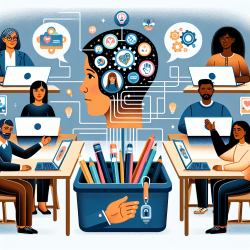As a Special Education Director, my primary mission is to ensure that every student receives the support they need to thrive academically, socially, and emotionally. School social workers play a crucial role in this mission, acting as the bridge between students, families, and educational staff. With the growing demand for specialized services such as speech therapy in schools, the need for innovative tools to address therapist staffing shortages has never been more pressing.
In recent years, online therapy has emerged as a viable solution to these challenges. Companies like TinyEYE have been at the forefront of this transformation, providing high-quality online therapy services that are both effective and accessible. As we delve into the benefits of these tools, it is essential to understand how they can empower school social workers to better serve their students.
The Role of Online Therapy in Schools
Online therapy, also known as teletherapy, offers a range of services including speech therapy, occupational therapy, and mental health counseling. These services are delivered through secure, user-friendly platforms that facilitate real-time interaction between therapists and students. Here are some key benefits:
- Accessibility: Online therapy eliminates geographical barriers, making it possible for students in remote or underserved areas to receive the support they need.
- Flexibility: Scheduling sessions becomes easier, allowing for therapy to be integrated seamlessly into the school day.
- Consistency: With online therapy, there is less disruption due to therapist shortages or absences, ensuring continuous support for students.
- Customization: Therapy sessions can be tailored to meet the specific needs of each student, enhancing the effectiveness of the intervention.
Creating Tools for Success
To maximize the benefits of online therapy, it is crucial to create and utilize tools that facilitate effective communication and collaboration among all stakeholders. Here are some strategies for school social workers:
- Professional Development: Participate in webinars, conferences, and training sessions to stay updated on the latest advancements in online therapy. This knowledge will enable you to advocate for and implement the best practices in your school.
- Collaboration: Work closely with therapists, teachers, and parents to develop individualized education plans (IEPs) that incorporate online therapy services. Regular meetings and open communication channels are essential for monitoring progress and making necessary adjustments.
- Resource Utilization: Leverage the resources provided by online therapy platforms, such as digital tools, activity libraries, and progress tracking systems. These resources can enhance the therapy experience and provide valuable data for evaluating student outcomes.
- Advocacy: Advocate for the integration of online therapy services within your school district. Highlight the benefits and share success stories to gain support from administrators and policymakers.
Inspiring Change
The integration of online therapy services in schools represents a significant step towards addressing the challenges of therapist staffing shortages and ensuring that all students have access to the support they need. By embracing these tools and strategies, school social workers can play a pivotal role in creating an inclusive and supportive educational environment.
At TinyEYE, we are committed to empowering school social workers with the tools and resources they need to make a meaningful impact. Together, we can inspire change and help every student reach their full potential.
For more information on how TinyEYE can support your school, please visit our website or contact us directly.










